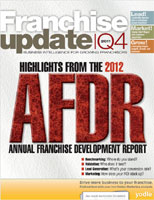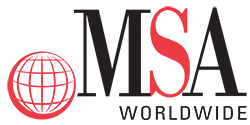Growing in a Changing Economy: Companies Focus On The Bottom Line
As an economist, I see some really challenging times ahead. As a businessman (and professed contrarian), I see some interesting opportunities. Let's take a look at both.
The world economy will be fortunate to realize a 3 percent growth rate in 2012. Less than 2 percent and we'll see a global recession, something too close to call at the moment. Europe is a mess, China is slowing down, and Japan is close to returning to the economy of its lost decade. With most other economies substantially smaller, we can't look to the ones just mentioned to be the engine of growth to get the world humming again.
That leaves the U.S. We're in the aftermath of the "Big Party." You remember the Big Party, we all had fun in it. The 2002 to 2008 period was marked with unprecedented consumer and government spending. Consumers bought everything they could using home equity, ATM, and credit cards. And the government managed to expand its spending across all continents and categories. Until both consumer and government debt get back to a more affordable level, the hangover will continue. It is going to take years--and it's not clear whether the government has the fortitude to deal with its portion of the tab and, if so, how it will do it. That uncertainty will further constrain business and consumer spending.
And before we get to a more robust economy, other fundamental economic issues must be resolved. The persistent unemployment and underemployment rates suggest we are in the midst of a structural change in employment ranks. There are many job openings in skilled and technical fields that only education and training can resolve. That's a long-term issue.
Housing is another fundamental economic issue that has a long path to balance. There are roughly 3 million vacant homes, another 3.5 million underwater mortgages, and about 2 million homes in default or delinquency. Until those are moved through the market (something the legal system currently is constraining), the market will not clear and we'll have flat and declining home prices and the accompanying uncertainty that produces in consumers' minds.
All the above would suggest it's time to hunker down and try to ride out the storm. If the storm were relatively short, I might agree. However, I believe we're seeing a gradual transition of the old guard (developed countries) toward the new guard (developing countries). In the next 10 to 15 years we'll see quite a few changes in the ranks of the top 25 economies.
For starters, China will overtake the U.S. as the world's largest economy in about 2022. I think that changeover will be marked by more dramatic swings in U.S. and global economies in coming years. In economic terms, the period from 1985 to 2007 could be considered the Great Moderation in business cycles, when dips were few and far between. From 1799 to 1929, nearly 90 percent of U.S. expansions lasted three years or less. With the Fed out of high-caliber ammunition and the political climate anything but conducive for a cooperative solution, it seems likely we're returning to the historical norm of more dramatic swings in economic activity.
What about a business perspective? Let's start with a look at the S&P 500. Do you know when more than half of those companies started? Good guess: during economic downturns. American business culture is built on entrepreneurism. The next wave of great companies has already been started. They're all around us. Bully for American business, but for many of you with growing or mature brands that just adds to the challenge. Even now we see new franchise brands being started, on average, every three days.
That leads me to a key driver for almost every company in the U.S. and certainly every franchisor: relentless pressure on spending your company's dollars wisely. In the economic turbulence ahead, companies will focus on the bottom line, not the top line. Whether marketing, franchise development, training, operations, or compliance, franchisors must be confident they are spending smartly and effectively. Having more and better information will guide franchisors through most decisions to a degree just barely being felt today. Picking the next area to develop will be made with forecasts of local, city, and county growth patterns 5 and 10 years from now, when your franchisees will still be running the businesses. Training will have more business-level skill development and information sharing to strengthen the franchisee overall. Support will find ways to overcome traditional legal barriers to do what's right and necessary with franchisees. And all of this will be benchmarked, not only internally but across brands and sectors.
We're seeing the power of this today with Bank Credit Reports (BCRs), which are a specialized form of benchmarking. While BCRs compare brands within franchising, their real power is that they provide a level of credit risk forecasting for banks that are shifting capital away from independent businesses (where banks struggle to have any predictive credit risk ability) toward franchising, which has a lot of credit risk predictability. In uncertain times, banks, franchise companies, and companies in general that can operate with better information will make better decisions and successfully navigate these choppier waters.
Darrell Johnson is president and CEO of FRANdata, an independent research company supplying information and analysis for the franchising sector since 1989. He can be reached at 703-740-4700 or [email protected].
Share this Feature
Recommended Reading:
FRANCHISE TOPICS
- Multi-Unit Franchising
- Get Started in Franchising
- Franchise Growth
- Franchise Operations
- Open New Units
- Franchise Leadership
- Franchise Marketing
- Technology
- Franchise Law
- Franchise Awards
- Franchise Rankings
- Franchise Trends
- Franchise Development
- Featured Franchise Stories
FEATURED IN

Franchise Update Magazine: Issue 4, 2011








 The franchise listed above are not related to or endorsed by Franchise Update or Franchise Update Media Group. We are not engaged in, supporting, or endorsing any specific franchise, business opportunity, company or individual. No statement in this site is to be construed as a recommendation. We encourage prospective franchise buyers to perform extensive due diligence when considering a franchise opportunity.
The franchise listed above are not related to or endorsed by Franchise Update or Franchise Update Media Group. We are not engaged in, supporting, or endorsing any specific franchise, business opportunity, company or individual. No statement in this site is to be construed as a recommendation. We encourage prospective franchise buyers to perform extensive due diligence when considering a franchise opportunity.